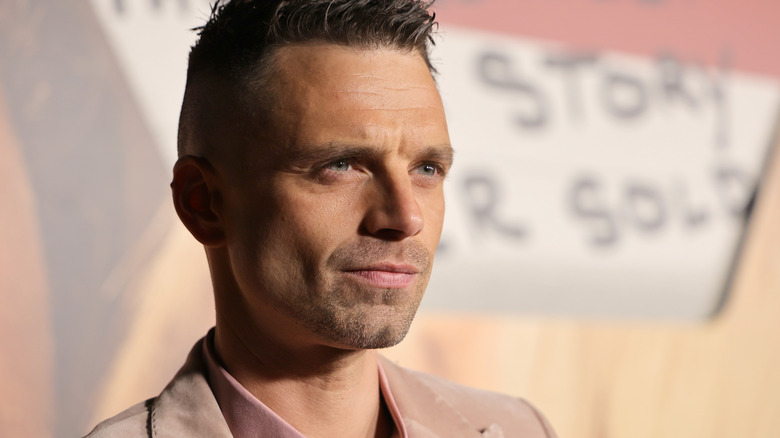Marvel's Sebastian Stan Got Candid About Body Image
"Falcon and the Winter Soldier" is on the air and Bucky fans everywhere are ecstatic to see their man back in action. Sure, his parachuteless landing might not be as smooth as Steve's, but that doesn't mean he's not delivering high-level action. And he's doing it with the muscled physique fans first saw in Civil War.
A physique that, despite its prevalence in action movies, does not come easily. And that's something the man behind Bucky has not been shy about addressing. Sebastian Stan is an incredibly varied actor, although he is best known as the brooding Winter Soldier. And while the character relies mostly on his physical presence, Stan himself is very different. In fact it has taken him years to get comfortable in his body and, in his own words, feel up to posting about his fitness progress.
"After 7 years with @donsaladino, I caught a good day, sucked it up and finally posted this... Been working with this guy through years of self-judgment and mental wars when it comes to fitness and LIFE, and TODAY I'm giving myself a break," Stan wrote in a 2019 Instagram post.
Stan linked up with Don Saladino shortly after finishing "The First Avenger." The two still work together today and it's easy to see why. Body image is a tough subject to address, especially in an appearance-driven field like entertainment. And finding someone who understands that and can help is rare.
Sebastian Stan addressed struggles with body dysmorphia after Pam and Tommy
In a 2022 interview with Entertainment Weekly, Stan discussed how the preparation process to play heavy metal rocker Tommy Lee in Hulu's original limited series "Pam and Tommy" affected his physical and mental health. "I was trying to lose weight and I still felt I didn't lose enough weight," Stan told the news outlet. "And people were telling me I was crazy and going, 'You have body dysmorphia now' — which I always did anyway."
In efforts to resemble Lee's figure as closely as possible, the actor shared the rigorous diet and exercise routine he underwent. "I was just running and trying to get 20,000 steps a day, and then I was fasting for 16 to 18 hours a day," Stan told Entertainment Weekly. He recalls striving for a peak physical appearance that Stan described as only existing in the mind. As defined by Mayo Clinic, body dysmorphic disorder is a mental health condition characterized by a preoccupation with one's perceived physical flaws that negatively affects one's daily functioning.
If you or someone you know needs help with mental health, please contact the Crisis Text Line by texting HOME to 741741, call the National Alliance on Mental Illness helpline at 1-800-950-NAMI (6264), or visit the National Institute of Mental Health website.
The Instagram effect
Stan's choice to post about his progress on Instagram is one mirrored by countless men every day. Stan, thankfully, knows the effect that the conversation around male body types can have on people scrolling Instagram. His goal in posting the picture was not only to share his progress but to be upfront about his own struggles, something he does regularly when it comes to his broader mental health. He largely shares this information in Q&As with fans but also touched on it in a 2019 Men's Health interview.
A study published in 2020 in the journal Cyberpsychology, Behavior, and Social Networking found that while posting fitness photos is common among men on Instagram, addressing potentially negative body image is not. Most men post to showcase their progress. And, perhaps unsurprisingly, men with higher muscle mass and lower levels of body fat received more interaction on their posts. The study concluded that this poses a serious risk to men. They feel pressured to meet the body standards in their Instagram feed and, for many, it is an incredibly difficult road.
Bradley University offers an excellent write-up that highlights the ways this pressure generally affects men. Compared to women, men are more likely to turn to substance abuse or develop "atypical" eating disorders. And while men seem less likely to body shame than women, they also talk about their struggles less often. This leaves them vulnerable to feelings of shame that they put off seeking help for. It's the sort of thing Sebastian Stan knows all too well. And although he plays a hero onscreen, there's something to be said for his work offscreen too.



